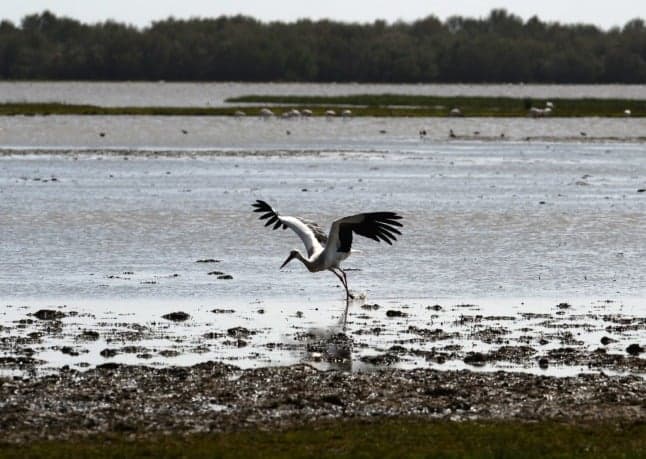Police operation targets illegal water tapping in Spain

More than 130 people were arrested or placed under investigation for illegal water tapping last year, Spain’s Guardia Civil police said on Wednesday following a huge operation.
During the year-long operation, “133 people were arrested or investigated for extracting water through more than 1,533 illegal infrastructure devices”, the police’s environmental unit said in a statement.
A similar operation in 2019 had targeted 107 people.
Spain is one of the European countries most at risk from the impact of drought caused by global warming, scientists say.
Water usage issues are often at the heart of heated political debates in Spain where intensive agriculture plays an important role in the economy.
Police said most of their operations took place “in fragile and vulnerable areas such as the Doñana natural park” in the southern Andalusia region, one of Europe’s largest wetlands and a Unesco World Heritage bird sanctuary.
They were also operating in “in the basins of Spain’s main rivers”.
In Doñana, police targeted 14 people and 12 companies for the illegal tapping of water for irrigation, a police spokesman said.
Ecologists regularly raise the alarm about the drying up of marshes and lagoons in the area, pointing the finger at nearby plantations, notably growing strawberries, which are irrigated by illegally-dug wells.
“The overexploitation of certain aquifers for many reasons, mainly economic, constitutes a serious threat to our environment,” the Guardia Civil said.
The European Court of Justice rapped Spain over the knuckles in June for its inaction in the face of illegal water extraction in Donana which covers more than 100,000 hectares (250,000 acres) and is home to more than 4,000 species, including the critically endangered Iberian lynx.
According to the government’s last official estimate, which dates back to 2006, there were more than half a million illegal wells in use.
But in a 2018 study, Greenpeace estimated there were twice as many, calculating that the quantity of stolen water was equivalent to that used by 118 million people — two-and-a-half times the population of Spain.
Spanish NGO SEO/Birdlife also on Wednesday raised the alarm about the “worrying” state of Spain’s wetlands.
Comments
See Also
During the year-long operation, “133 people were arrested or investigated for extracting water through more than 1,533 illegal infrastructure devices”, the police’s environmental unit said in a statement.
A similar operation in 2019 had targeted 107 people.
Spain is one of the European countries most at risk from the impact of drought caused by global warming, scientists say.
Water usage issues are often at the heart of heated political debates in Spain where intensive agriculture plays an important role in the economy.
Police said most of their operations took place “in fragile and vulnerable areas such as the Doñana natural park” in the southern Andalusia region, one of Europe’s largest wetlands and a Unesco World Heritage bird sanctuary.
They were also operating in “in the basins of Spain’s main rivers”.
In Doñana, police targeted 14 people and 12 companies for the illegal tapping of water for irrigation, a police spokesman said.
Ecologists regularly raise the alarm about the drying up of marshes and lagoons in the area, pointing the finger at nearby plantations, notably growing strawberries, which are irrigated by illegally-dug wells.
“The overexploitation of certain aquifers for many reasons, mainly economic, constitutes a serious threat to our environment,” the Guardia Civil said.
The European Court of Justice rapped Spain over the knuckles in June for its inaction in the face of illegal water extraction in Donana which covers more than 100,000 hectares (250,000 acres) and is home to more than 4,000 species, including the critically endangered Iberian lynx.
According to the government’s last official estimate, which dates back to 2006, there were more than half a million illegal wells in use.
But in a 2018 study, Greenpeace estimated there were twice as many, calculating that the quantity of stolen water was equivalent to that used by 118 million people — two-and-a-half times the population of Spain.
Spanish NGO SEO/Birdlife also on Wednesday raised the alarm about the “worrying” state of Spain’s wetlands.
Join the conversation in our comments section below. Share your own views and experience and if you have a question or suggestion for our journalists then email us at [email protected].
Please keep comments civil, constructive and on topic – and make sure to read our terms of use before getting involved.
Please log in here to leave a comment.